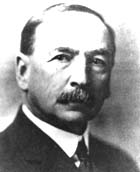William A. Sloane (October 10, 1854 - April 21, 1930)
 Presiding Justice, September 9, 1929 - April 21, 1930
Presiding Justice, September 9, 1929 - April 21, 1930William A. Sloane served as the first Presiding Justice of the Fourth District Court of Appeal upon its creation in 1929. He was born in Rockford, Illinois, on October 10, 1854. Educated in the public schools of Missouri and a graduate of Iowa College in 1877, he studied law and was admitted to the Missouri Bar in 1878. Until 1880, he practiced law in Sedalia where he was also the Editor of the Eagle-Times. He then moved to Carthage, Missouri, where he was the managing Editor of the Daily Banner for four years. In 1886, he moved to San Diego where he re-entered the practice of law. In 1888, he was elected to the first of two terms as Justice of the Peace. In May 1911, Governor Hiram Johnson appointed him to the San Diego County Superior Court, an office he held until January 1, 1919, when he became an Associate Justice on Division Two of the Second District Court of Appeal in Los Angeles. On May 3, 1920, he was appointed Justice of the Supreme Court, where he served until his term expired on January 8, 1923. He was the second San Diegan and 57th Justice to serve on the Supreme Court. (Justice John D. Works was the first San Diegan and 37th Justice to serve on the Supreme Court from 1888 to 1891.)
In 1929, the Fourth District Court of Appeal was established - a circuit riding court sitting four months each in Fresno, San Bernardino and San Diego. Judge Sloane was appointed on September 6, 1929, as its first Presiding Justice. Governor C.C. Young appointed him on his own initiative without solicitation from anyone given Judge Sloane's appellate experience. Although Judge Sloane initially declined the appointment, the Governor insisted upon his acceptance and finally prevailed. The oath of office was administered on September 9, 1929. Following surgery, Presiding Justice died on April 21, 1930, at the age of seventy-five. His contemporaries characterized him as an unselfish patriot for the public good whose name was synonymous with conscientiousness and progressive work. At the Court's Memorial Session in his honor, he was eulogized as a jurist who was "always fair, courteous and thoughtful, and possessed that judicial poise which gave assurance to friends and foes alike that any case submitted to him, regardless of the result, would receive a fair and impartial consideration. He was a true lover of justice and recognized the ideal of Cicero, that the purpose of all judicial proceedings is that 'No one shall be harmed, and the public weal be served.'"
